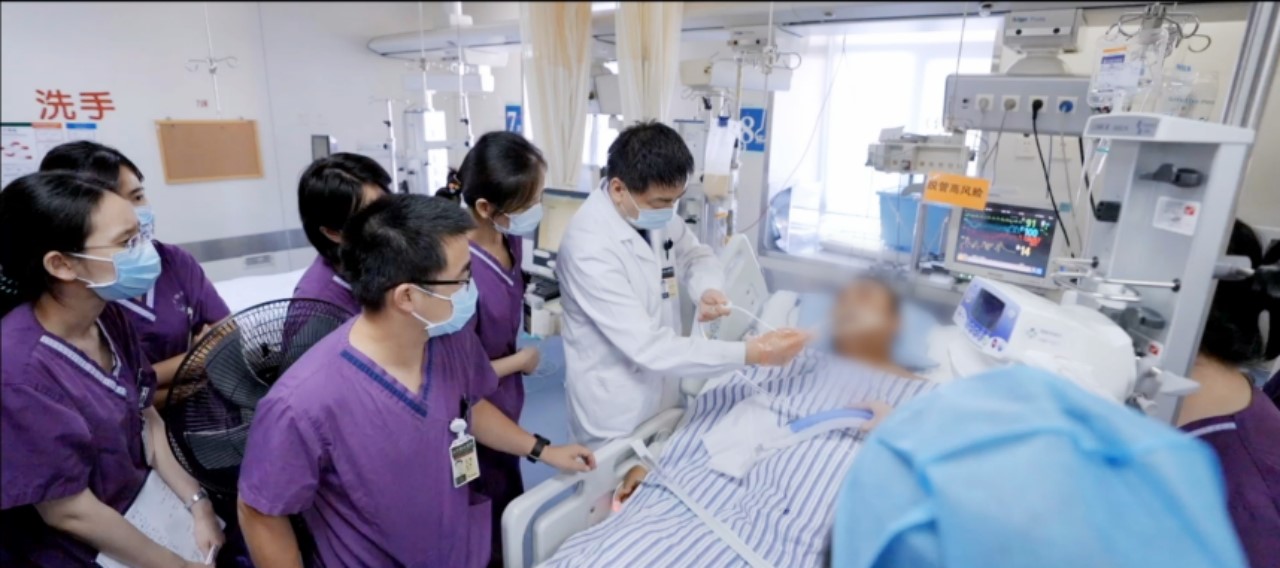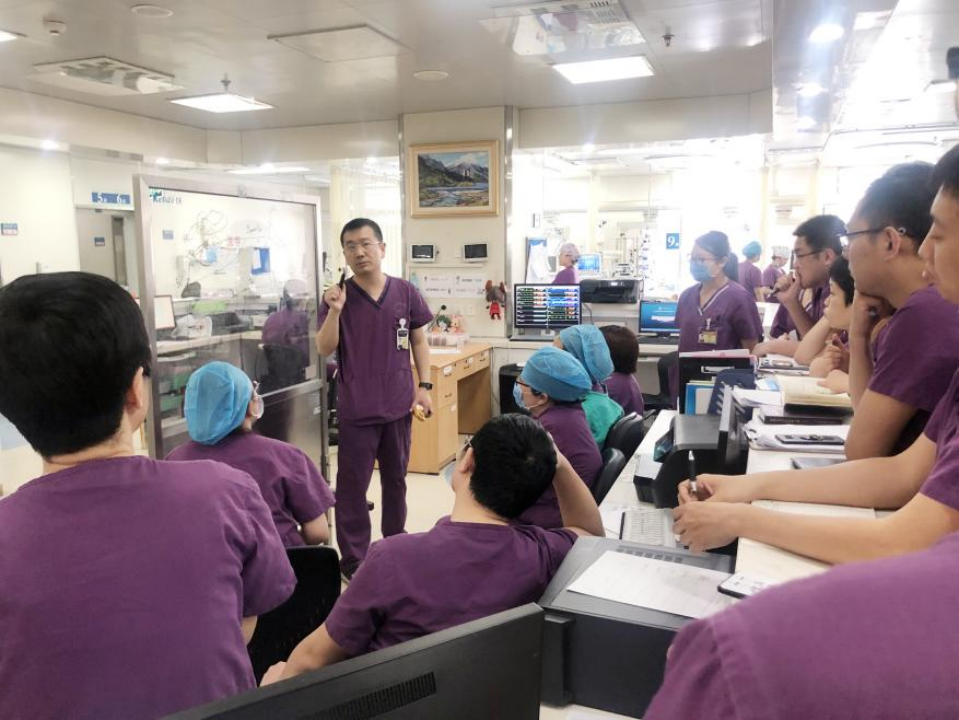Founded in 2005, the MICU (Department of Medical Intensive Care Unit) of PUMCH is a comprehensive ICU that mainly treats patients in severe medical conditions. Since its establishment more than 10 years ago, MICU has played an important role in the discipline development, diagnosis and treatment promotion and scientific research of critical care medicine in China. Moreover, it has participated in medical treatment in public health emergencies for many times. The specialty of CCM at PUMCH, jointly supported by the MICU and the Department of ICU, ranked first in the “2020 China Hospital Specialty Reputation Ranking” released by the Hospital Management Institute of Fudan University and the “2020 Chinese Hospital/Chinese Medical School Science and Technology Evaluation Metrics (STEM)” published by the Institute of Medical Information of the Chinese Academy of Medical Sciences (CAMS).
Enhance Clinical Research
Under the leadership of Professor Du Bin, the founder and leader of the department, MICU established the first China Critical Care Clinical Trials Group (CCCCTG). This is the only collaborative platform for clinical research in CCM in China that conforms to international clinical trial standards. Up to now, CCCCTG has engaged 25 ICUs of tertiary Grade A hospitals with 1,838 ICU beds and over 70,000 critically ill patients admitted annually. Since its establishment, CCCCTG has led 14 clinical studies and published 25 SCI papers. This has not only promoted the academic exchange between China’s CCM community and international counterparts, but also provided great impetus for it to gain global prominence.
Prof. Du Bin has been awarded the Safar Global Partner Award by the Society of Critical Care Medicine (SCCM) in 2018 for his global influence in the field of CCM and outstanding contributions to promoting the international exchange in CCM. He is the first Chinese doctor to receive this award.
Improve the Clinical Prognosis for Patients
As a major cause of death among critically ill patients, sepsis has become an important public health problem worldwide. In recent years, the MICU team has studied the disease burden of sepsis from different dimensions, conducted an in-depth study on the impact of demographic characteristics and socioeconomic factors on mortality, and reported the status of the disease burden of sepsis in China for the first time in the international arena.
For patients with sepsis, the accurate identification of pathogenic microorganisms is a prerequisite to deliver accurate antibiotic treatment. Thanks to MICU’s effort in finding the best identification strategy by integrating multiple microbiological approaches, the mortality rate of sepsis patients has dropped from 36% to 19%.
The department has also led the phase I and phase II clinical trials of Kukoamine B Mesilate, a new class I innovator drug for sepsis. Moreover, Prof. Du Bin was invited to participate in the drafting of the “2021 Surviving Sepsis Campaign Guidelines” , and this is the first time that a Chinese scholar was involved in the compilation since the guideline was first published in 2004.
Share the Experience of Diagnosis and Treatment in CCM
Over the past 10+ years, the MICU has translated its experience and achievements in CCM into clinical treatment for public health emergencies and epidemic diseases in China. When the COVID-19 pandemic broke out in early 2020, Professor Du Bin, who was the only CCM expert in the high-level expert group of the National Health Commission (NHC), set off immediately for Wuhan on January 18. Later, the department sent 14 more healthcare workers to the front line in Wuhan. Staff from MICU worked closely with peers by drawing on their expertise and sharing their rich experience in CCM with the medical communities in China and overseas.
With the support of the National Key Research and Development Program and the CAMS Medical and Health Technology Innovation Project, the department has carried out the Project of Optimization of Treatment and Treatment Plan for Critically Ill Patients and Research on Clinical Critical Care Treatment Strategy. As a co-first author, Prof. Du Bin summarized the clinical characteristics and prognosis of COVID-19 patients and published his findings in the “New England Journal of Medicine”. His papers have played an important role for the international medical community to understand this emerging and unexpected infectious disease. In addition, he was also involved as co-first or corresponding author in the comprehensive and systemic summary of multiple etiology and supportive treatment options for COVID-19 patients in severe conditions.
As a member of the high-level expert group of the NHC, Prof. Du Bin fully participated in the formulation of the second to ninth editions of the “Diagnosis and Treatment Protocol for COVID-19” released by NHC. His summary of valuable experience in early implementation of mechanical ventilation and prone positioning ventilation for critically ill patients has been adopted by the protocol. As a co-corresponding author, he presided over the establishment of one international COVID-19 guideline. He has contributed to two WHO clinical guidelines on COVID-19 and four international clinical guidelines and consensus on COVID-19 as the lead author. His work is a testament to the important role Chinese CCM experts have played in fighting against COVID-19 and their great contributions, which also shows that China’s groundbreaking work in the diagnosis and treatment of COVID-19 is in the top league worldwide.
Drive CCM Forward
As an active player in the collaborative and standardized development of CCM, the PUMCH MICU is committed to promoting CCM education in China and cultivating a professional talent pipeline. As the leading unit of standardized training for CCM residents and specialists, the department has rallied peers to develop detailed and standardized training syllabus and rotation programs. It has also established and improved the high-quality standardized training system for CCM specialists and residents in China. Under its leadership, investigations were conducted, and the “Consensus on Core Competencies of Chinese Critical Care Medicine Doctors” was published on “Critical Care”.
The “Basic Assessment and Support in Critical Care Medicine (BASIC)” training program rolled out by the department has trained more than 1,000 trainees, which has played a crucial role in building a high-quality CCM talent pipeline and pushing forward CCM in China. The training program is also available in more than 20 countries and regions around the world and has been accredited by many international academic organizations such as the World Federation of Societies of Intensive Care Medicine (WFSICCM), the European Society of Intensive Care Medicine (ESICM) and the Asia-Pacific Association of Critical Care Medicine (APACCM), which gives a great impetus for China’s CCM to rise to global prominence.
In the future, the MICU will continue to push forward the development of CCM in China by diving deep to improve its expertise, improving the service with tireless efforts, strengthening the sepsis research system, and enhancing the training of specialists.

Group photo of MICU

Prof. Du Bin was attending to a patient during a ward round

Prof. Weng Li was explaining the pathophysiology of ECMO
Picture courtesy: Sun Liang
Translator: Liu Haiyan
Editor: Jiang Wei and Wang Yao
